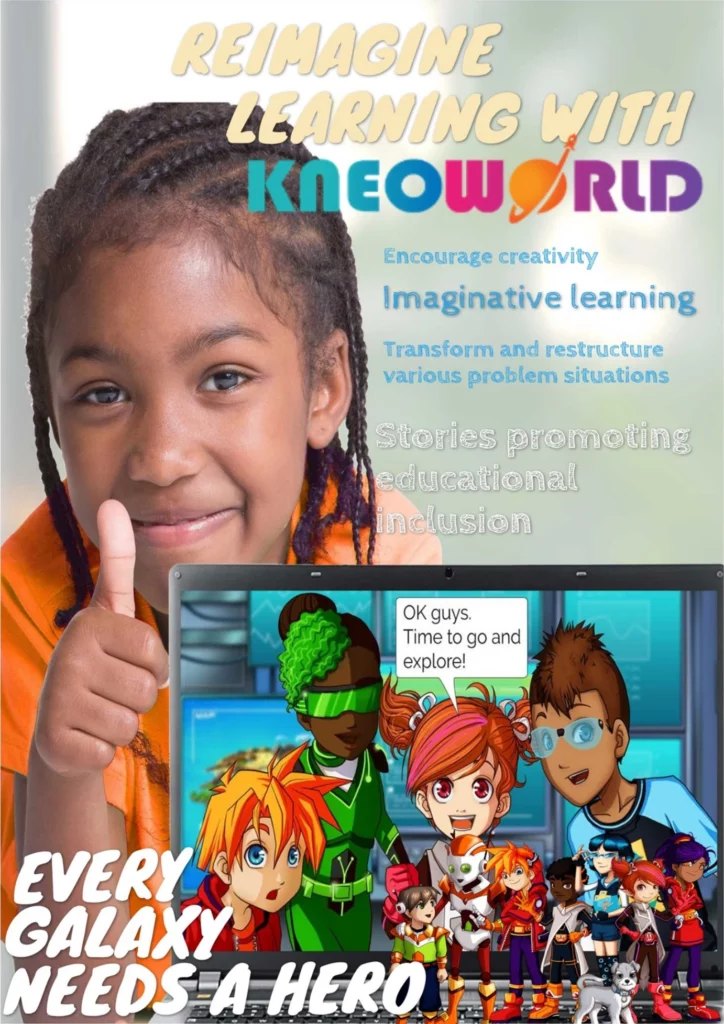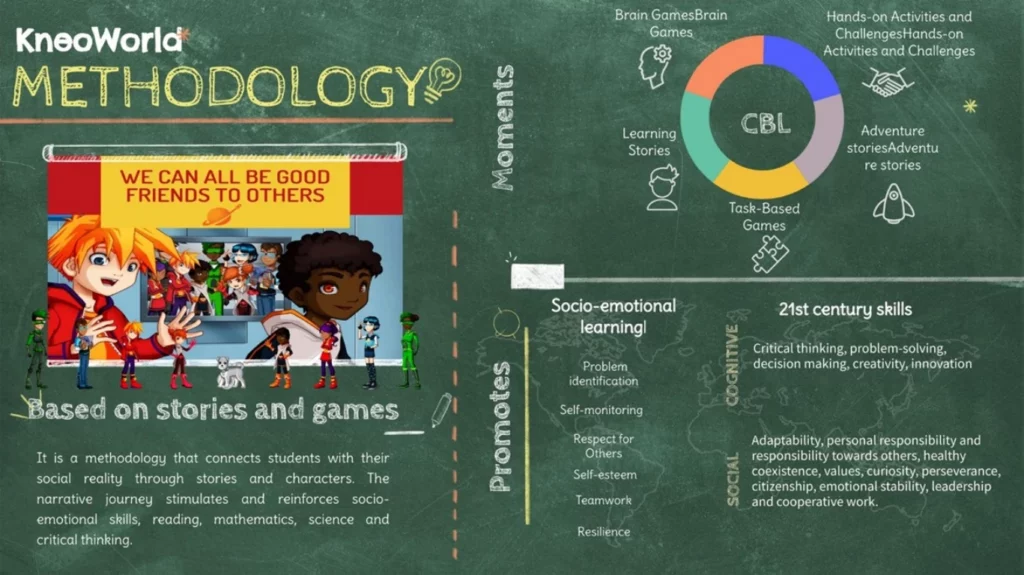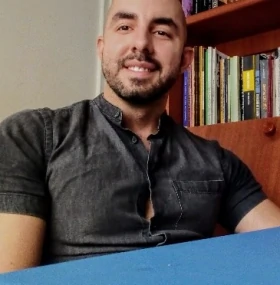This Article has been converted from PDF to HTML so people can view it on any device. The original document was designed for Desktop/paged viewing, so in some cases, it may not present perfectly when viewed on mobile phones.
Alternatively, you can view the original PDF version.
International Journal of Latest Research in Humanities and Social Science (IJLRHSS)
Volume XX – Issue XX
www.ijlrhss.com
Feeling, Listening and Thinking in Pandemic
An Educational Experience from KneoWorld1
Deyby Rodrigo Espinosa Gómez
Magister Magna Cum Laude in Education.
Graduate in Social Sciences.
University of Antioquia.
Kneoworld pedagogical and research support
Abstract: The Covid-19 pandemic has represented an unprecedented crisis in all social spheres. Home confinement has affected the economic and emotional health of families, as well as the children’s socialization processes, which resulted in an increase of stress and domestic violence. In the field of education, it has led to the closure of schools and educational centers worldwide, putting the well-being and protection of children at risk.
KneoWorld understands that education is one of the most sensitive and crucial dimensions for the development of a society, therefore, this article proposes pedagogical elements from virtual education to strengthen a more humanistic education in times of pandemic. The world is changing and KneoWorld methodology is committed to innovative education.
Keywords: Educational experience, Education, Pandemic, Pedagogy, socio-emotional education.
Turning into a pandemic
No one could imagine that by the year 2020 there will be such an abrupt change at a global level as that generated by the ARS-CoV-2 virus, as the World Health Organisation (WHO) declared a pandemic state (Adhanom, 2020). According to Unesco (2020), Covid led to the closure of schools as an emergency measure, affecting access to education for 89% of the student population worldwide. In addition, the OECD (2020) warned that the suspension of face-to-face classes had a negative impact on food, family life, physical and mental health, but especially on the cognitive and socio-emotional development of our children and young people.
This reality has created unprecedented challenges for education systems (Jacovkis and Tarabini, 2021), while highlighting the inequality of the global school system (Tarabini, 2020).
KneoWorld has risen up to the challenge of virtual education in times of pandemic, which demanded for pedagogical, didactic and technological improvement for the teaching of reading and mathematics, from KneoWorld:
As educators, we have very real concerns about the effects of Covid on our students. We worry about the learning loss and emotional impacts that may be affecting all children. We are concerned about how changes in the ways learning is being delivered unsettles our families. We are particularly apprehensive about our students who have experienced or are experiencing trauma in their lives, and for whom this global crisis adds another layer of distress (KneoWorld, 2021).
In this way, education has had a 180° turn, which has meant that education must be redesigned to go beyond text books and test results, and in this way, put the human being, the student, at its center, because education must be understood as the basis of society.
In other words, the current situation caused by the Covid-19 pandemic further emphasizes on the need to acknowledge and cultivate socio-emotional skills such as stress management, adaptability and empathy, as these are crucial for coping with this period of uncertainty and mitigating the negative impacts of the pandemic. The constant changes in our society and crises such as the one we are experiencing push us to develop new educational and pedagogical practices, and therefore, an education of and for care, an education for life in which we learn to be more resilient and adaptable.
Caring for each other. Educational purpose
Today, more than ever, there is a need to consciously and systematically develop the social-emotional skills that students need to successfully cope with the changing, uncertain and stressful circumstances they are currently experiencing, not to mention other chanlleges they will experience later in life as adults.
The director and founder of the Yale University Center for Emotional Intelligence Marc Brackett (2020) points out how important it is for adults to understand how our emotions influence ourselves and everyone around us, not just schoolchildren. According to this specialist we need to cultivate skills and become positive role models.
Parents and educators must demonstrate their ability to recongnize and regulate their own emotions before transmitting them to others, and in this regard, Brackett’s research (2020, p.32) has shown that when there is an emotionally skilled teacher, students are more focused and improve their academic performance; when there is an emotionally skilled principal, teachers are less stressed and more satisfied. And when there is an emotionally skilled parent, children are more capable to identify and regulate their emotions. Thus, identifying emotions is essential to creating a healthier, more equitable, more innovative and more cooperative world.
In relation to this topic, teachers Dae-Seok and Eunyoung Hong (2019) in their research “Social and emotional learning in the classroom: Perceptions and practices of language and literature teachers in South Korea and the United States” point out the importance and positive effects of social-emotional education in the education of children, in preparation for life. In this sense, they highlight how essential it is that in our education students learn to recognize their emotions and to interact with those of others, which, according to Dae and Eunyoung, allows them to face challenges and overcome social conflicts, build human relations and promote healthy coexistence.
According to Dae and Eunyoung (2019) social and emotional learning helps to improve students’ behaviors and the classroom environment. When students engage in learning with positive attitudes, it boosts the overall classroom environment and alleviates classroom management problems.
For his part, Francisco Mora, PhD in neuroscience (5 September 2019) tells us that “the brain only learns if there is emotion”. For this specialist, it is not a question of encouraging emotions in the classroom, but of teaching with emotion, which means making whom is taught curious. Curiosity awakens the attention of the listener and he or she learns automatically, which obviously leads to better learning. Nothing can be learned without an awakened, sustained, conscious attention. And nothing raises attention more than that which is different and curious.
In relation to Mora’s approach, the prominent scientist and National Science Prize winner Humberto Maturana, postulates that emotions are much more than just an aspect to be considered to explain actions. For Maturana, emotions are dynamic bodily dispositions that are at the basis of actions and that all human action is based on an emotion, in his words:
“… what we connote when we speak of emotions are different domains of possible actions in people and animals, and the different bodily dispositions that constitute and realize them. (…) there is no human action without an emotion that founds it as such and makes it possible as an act. (…) it is not reason that leads us to action but emotion” (Maturana 1990: 20- 21).
Hence, it is essential for the KneoWorld programme to stimulate and recognize the emotions of the students, to promote values and care among all. Caring becomes an educational purpose. Therefore, through an active methodology such as Challenge Based Learning (CBL), KneoWorld is committed to cultivate collaborative work, creativity, critical thinking and self-regulation on the part of the students.
A curious and creative methodology2
“Tell me and I forget, teach me and I remember, involve me and I learn”.
Benjamin Franklin
KneoWorld is committed to an innovative methodology that actively involves the student in a real and contextual problem situation, inviting the student to use critical thinking, self-regulation and teamwork to find solutions to the problem.
The implementation of CBL seeks to strengthen the connection between what children learn at school and what they discover outside of school, and to take advantage of their curiosity and creativity. It should be noted that this methodology is based on experiential learning, which has as its fundamental principle that students learn best when they actively participate in open learning experiences, as they discover for themselves, try out solutions and interact with other students within a given context (Moore, 2013). Experiential Learning is an integrative holistic approach to learning, combining experience, cognition and behavior (Akella, 2010).
How does the KneoWorld methodology work?
KneoWorld has developed its own methodology that, through the practice of CBL, involves students in problem situations, awakening their creativity and critical thinking. It does this through classes that include (See fig. 1):

- Learning stories: Consists of grade-specific, pedagogically developed stories linking conceptual understanding with problem-solving skills.
- Task-based games: Through these educational games, designed in accordance with academic standards, students are encouraged to practice key skills and concepts in order to better understand the various subjects. As students do this, teachers and parents can monitor their learning process in real time through KneoWorld analytics, which is a simple and easy-to-use dashboard.
- Brain games: In addition to the previous phase, KneoWorld offers hundreds of educational problem-solving activities to stimulate and motivate children’s creativity, reflection and critical thinking. KneoWorld understands and activate the power of play in learning.
- Adventure Story: One of the key moments of the methodology, students connect with a group of KneoExplorers (stories with teaching and reflective characters) who take them on an epic journey of discovery through knowledge. These stories engage students with while stimulating and reinforcing skills in reading, mathematics, social studies, science, technology and critical thinking (see fig. 1).
- Practical activities and challenges: In this phase creative thinking is put into practice, through activities previously designed by teachers and aligned with academic standards, students are invited to strengthen their skills and comprehension of classroom concepts on or off screen.
Figure 1. KneoWorld Methodology

Source: Own elaboration.
Fig. 2. Alfie and KB1.
Characters KneoExplorers

The characters include Alfie, who is a scientific developer and transforms the knowledge generated by others into something that society can benefit from. Alfie invites students to care about health, healthcare and the environment. Alfie communicates through KB1 and understands sign language.
KB1 is a very curious character, acting as a detective, involving students to gather elements to solve puzzling situations; he gathers information to create new and useful elements or opportunities for good living.
Based on the above, the methodology proposed by KneoWorld requires firstly a sensory and emotional commitment from the student. Secondly, a dialogical encounter between students and teachers, involving listening, feeling and discussing the lived experience.
Thirdly, the experience is put into practice and tested in the recognition of the context. KneoWorld methodology is always based on a reading of the context of its students, it is committed to an encounter and recognition of diversity.
The foundation of KneoWorld is constant reflections upon theories and concepts that can be integrated in classes. For this reason, the stories, narratives and games involve reflection, analysis and social activities.
Final considerations
The pandemic demands educational transformations and invites us to recognize virtual education as an educational opportunity rather than an imposition. Likewise, the current situation requires an education that focuses on and stimulates socio-emotional life skills. The current technologies makes it possible to break from digital illiteracy.
Social-emotional skills are formed throughout life and in different contexts such as at home, at school and in the society. The KneoWorld educational programme understands the need and importance of developing emotional skills in times of pandemic and for the lives of students and their families. Training in this aspect has an impact on the social and mental well-being of the students, which stimulates critical thinking in the face of situations and problems that arise on a daily basis.
Therefore, for KneoWorld it is important to implement an active methodology that stimulates adaptive learning, allowing to identify and work on the personal needs of each student (Espinosa, 2021). This methodology is adapted to learning in real time, which allows us to understand the strengths and weaknesses of each student, so that educators can design pedagogical strategies to support learning.
Finally, KneoWorld is committed to the importance of an active and emotionally intelligent classroom, as it believes that successful education occurs in contexts where there are healthy relationships between teacher-student and family.
Listening, Feeling and Thinking from a horizontal relationship with students and their families has fostered cooperative learning and classroom management. In addition, teamwork encourages the recognition of the diversity of the student population that is part of KneoWorld, complementing the development of socio- emotional skills, reading comprehension and mathematics.
References
[1]. Adhanom, T. (2020). Coronavirus: WHO declares global pandemic for Covid-19. Medical Editor. [online] https://www.redaccionmedica.com/secciones/sanidad-hoy/coronavirus- pandemia-brote-decovid-19-nivel-mundial-segun-oms-1895
[2]. Akella, D. (2010). Learning together: Kolb’s experiential theory and its application. Journal of Management and Organization, 16(1), 100-112.
[3]. Brackett, M. (2020). Permission to feel. Editorial Planeta.
[4]. Espinosa, D. (2021). KneoWorld: An Educational Program towards Educational Equity. Global Journal Of Human-Social Science Research. Retrieved from https://socialscienceresearch.org/index.php/GJHSS/article/view/3860
[5]. J. Jacovkis, A. Tarabini. (2021). COVID-19 and distance schooling: old and new inequalities. Journal of Sociology of Education-RASE, 14: 85- 102.
[6]. Kim, Dae-Seok and Hong, Carrie Eunyoung. (2019). Social and emotional learning in a classroom: Language arts and literacy teachers’ perceptions and practices in South Korea and the United States. i.e.: inquiry in education: Vol. 11: Iss. 2, Article 7. Retrieved from: https://digitalcommons.nl.edu/ie/vol11/iss2/7
[7]. KNEOWORLD. (2021). The Pandemic Effect – What Can We Do For Ourselves So We Can Help Our Students? Retrieved from: https://www.kneoworld.com/2021/05/01/thepandemic-effect-what-can- we-do-for-ourselves-so-we-can-help-our-students/
[8]. Maturana, H. (1990). Emotions and language in education and politics. Dolmen. Santiago.
[9]. Moore, D. (2013). For interns, experience isn’t always the best teacher. The Chronicle of Higher Education.
Retrieved from: http://chronicle. com/article/For-Interns-Experience-Isnt/143073/
[10]. Mora, M. (5 September 2019). “The brain only learns if there is emotion”. Education 3.0.
Retrieved from https://www.educaciontrespuntocero.com/entrevistas/francisco-mora-el- cerebro-soloaprende-si-hay-emocion/
[11]. Tarabini, A. (2020). What is school for? Sociological reflections in times of global pandemic. Revista de Sociología de la Educación-RASE, 13: 145-155.
[12]. UNESCO (2020). “Nuevaspublicacionescubanas para enfrentarefectos de la COVID-19 sobre la educación”, UNESCO Havana Office [online] https://es.unesco.org/news/nuevaspublicaciones-cubanas-enfrentar- efectoscovid-19-educacion [date accessed: 12 June 2020].
Author Profile
 Deyby Rodrigo Espinosa Gómez.
Deyby Rodrigo Espinosa Gómez.
He was born in Medellín, Colombia. He holds a Magna Cum Laude Master’s degree in Education and a Bachelor’s degree in Social Sciences. He currently works as a public school and postgraduate teacher at the University of Antioquia. He is also an active member and researcher of the educational programme KneoWorld. He is a writer and researcher on issues related to education, teachers, schools and pedagogical training. He has a diploma in Human Rights, a diploma in Action Research and Youth, a diploma in educational inclusion and a diploma in pedagogy. His teaching is based on listening, dialogic and critical pedagogy.
2 KneoWorld at a Glance https://youtu.be/1SkVWubFwp8

